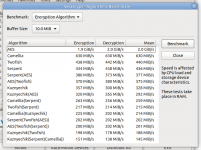For me it is a clear decision: I want to keep my private data private – as much as possible: You never know what a browser might keep and reveal in history/cache without you realizing it. What is a simple, innocent statement today, might be Thoughtcrime tomorrow.
Most of the time I got called a paranoid weirdo even for using encryption in a casual way (main PCs only). Now I went much further
Lately I’ve zeroed out all old HDDs (which still turned on) and gave all others to the recycling.
All “vintage” computers are empty now or just contain a freshly installed OS. Still have to check a few SDs and flash sticks and perform full overwrite.
All newer machines which are strong enough have full disk encryption with very complex passphrase. Same goes for all backup copies.
Title says the most: I’m interested in the question if GBAtemp members encrypt some personal data or even their complete systems.
Would you feel comfortable if an unauthorized person had physical access to your computer(s)?
Would you feel comfortable that law enforcement would not find anything suspicious if your machine was confiscated? → "Somebody innocent doesn't have to fear anything."

Most of the time I got called a paranoid weirdo even for using encryption in a casual way (main PCs only). Now I went much further
Lately I’ve zeroed out all old HDDs (which still turned on) and gave all others to the recycling.
All “vintage” computers are empty now or just contain a freshly installed OS. Still have to check a few SDs and flash sticks and perform full overwrite.
All newer machines which are strong enough have full disk encryption with very complex passphrase. Same goes for all backup copies.
Title says the most: I’m interested in the question if GBAtemp members encrypt some personal data or even their complete systems.
Would you feel comfortable if an unauthorized person had physical access to your computer(s)?
Would you feel comfortable that law enforcement would not find anything suspicious if your machine was confiscated? → "Somebody innocent doesn't have to fear anything."



 I can hardly imagine a statement more wrong than this. Hardly worth the effort unpacking.
I can hardly imagine a statement more wrong than this. Hardly worth the effort unpacking.




